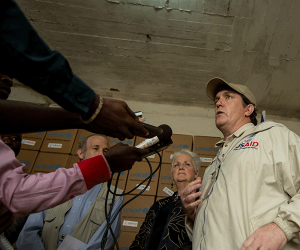Let’s Not Poison the Well – How the Media Can Help Combat Ebola-related Stigma

USAID official being interviewed by local journalists about its initiative with the Paul G. Allen Family Foundation to provide 9,000 household protection kits as part of the response to help Liberians fight Ebola. Each kit includes biohazard bags, soap, PPE, and gloves. Photo courtesy USAID, by Morgana Wingard
I’ve been reading a book on HIV prevention in which the French anthropologist, sociologist and physician, Didier Fassin [1] is quoted as saying that epidemics are moments of truth for society, when power and knowledge become manifest. I keep thinking of Fassin’s words in light of the Ebola outbreak, the fear and panic that is integral to the story, and the profound effect that stigma has on the lives of those affected by such a polarizing disease.
Fear and stigma are very often common human reactions to disease, especially one that is highly infectious, spreads quickly, and for which there is still no known cure. Because it is such a frightening, dehumanizing disease, rumor and misinformation are quick to follow as people try to make sense of the illness. With a handful of cases having cropped up in countries other than the ones in Africa where the virus is taking a massive and deadly toll, it seems that fear itself is out of control, as is the deepening stigma of those affected – not only the individuals, but also the countries: Liberia, Sierra Leone and Guinea.
One of the best ways still to counter misinformation and rumor is to work with the media in their role as public educators – especially if it offers two-way communication channels for information exchange with communities affected by the outbreak – so that they can participate in the dialogue. In Guinea for instance, where Internews is working with journalists to gain the skills needed to report on this humanitarian crisis, the interactive power of radio (along with mobile phones) provide exactly this kind of platform that engages people in the conversation related to their health and well-being. Radio remains one of the most trusted sources of information in this area, and in the municipalities where Internews works, is still the only form of media available to people, and an important way to address issues of stigma, through well-sourced, accurate and actionable information.
In the context of the three countries directly affected by the outbreak, Internews president, Jeanne Bourgault, and Daniel Bruce, chief executive of Internews Europe, also recently addressed the problem of misinformation and stigma, and how, in this climate of fear, local media can help to save lives in a blog on The Guardian. “In recent weeks, fear and misunderstanding have claimed new kinds of victims, including the three journalists killed in Womme, Guinea, along with five health workers, after they were attacked by villagers so terrified of the disease that they feared any outsider could infect their village,” they wrote. They also quoted a Liberian official who said that misinformation was hampering efforts to tackle the outbreak there, citing rumors that an educational film shown to villagers is intended merely to distract people while officials literally poison the wells. “In such a climate, it is vital that governments and the international community understand that epidemics are exacerbated by misinformation, and that medical efforts to combat the disease must be accompanied by work to curb the spread of rumors and false news.”
Bourgault and Bruce make the critical point that “unless trust has been established, getting the message ‘right’ does not mean that it will be accepted. Credible sources of information in the local language have the greatest impact: this is why word-of-mouth is so powerful, often dangerously so. But it is also why local media can be so effective.”
Local journalists therefore have a very important role to play. If they have the resources and understand the science of the disease, they can help expand the conversation to include the voices of local communities. They quote René Sakèlè, a journalist with Radio Rurale in N’Zérékoré, Guinea, and member of a team working with Internews to produce a humanitarian radio program on Ebola in Guinea, as saying that the experience had helped to expand journalists’ view on “who is qualified to talk about the disease […] I [now] know that there are not only ‘official’ sources. There are also [health] experts, civil society, youth and women – who can all say something about Ebola.”
But journalists need the tools and the skills to report on such a complex medical issue as Ebola, as they, like the health care workers, are often on the frontlines of reporting the disease, combatting rumor and stigma. Public health messages are a critical component, but messaging alone and in isolation will not convince people who have heard and believed rumors from their friends and families. People gather information in 360-degree environments. They need to “own” the information – feel that it makes sense, speaks to them directly, and is something that is so convincing and real that they want to share it forward, and make sure that others hear the message too. In this way, radio is still a powerful tool with which people can engage.
As Bourgault and Bruce noted: “Journalists alone cannot turn the tide against Ebola, but they must be part of the solution.”
This post originally appeared on the Ebola Communication Network.
[1] Fassin, D. (2007). When bodies remember: Experiences and politics of AIDS in South Africa. Berkeley, University of California Press.








Leave a Reply
Want to join the discussion?Feel free to contribute!